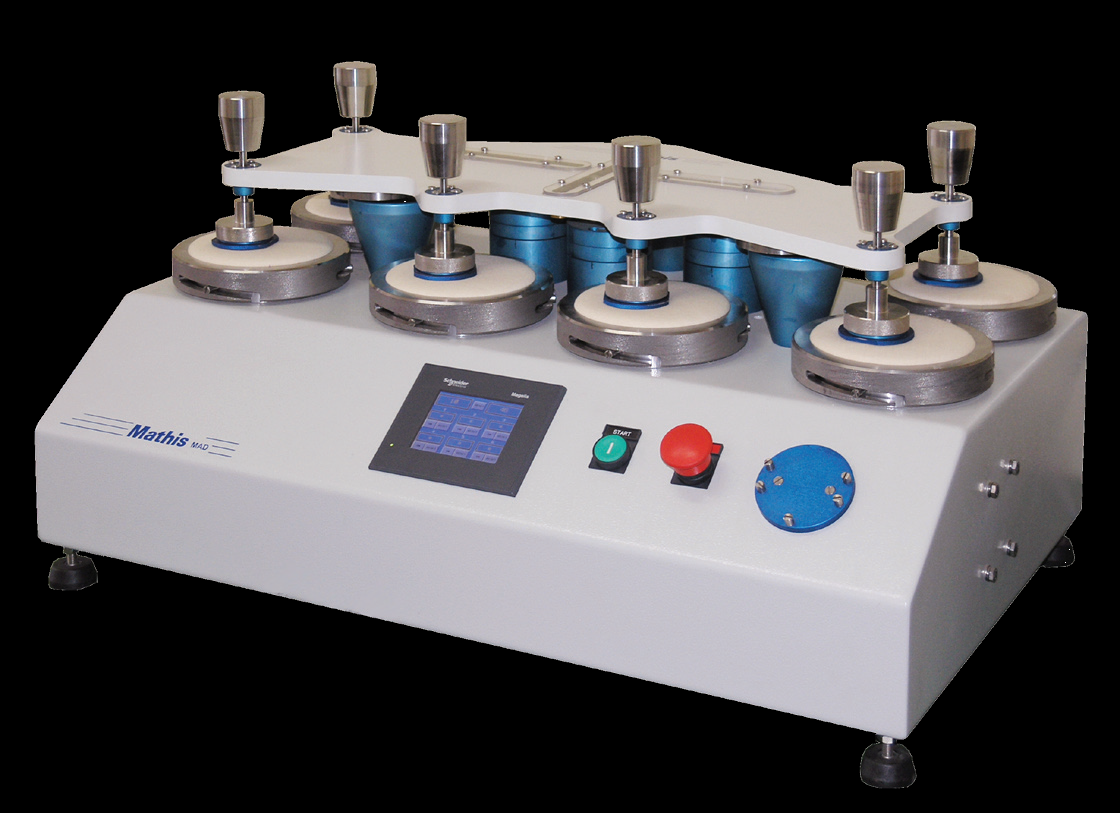ASTM D7255 Abrasion resistance using falling sand test
The ASTM D7255 standard specifies a method to evaluate the abrasion resistance of textile materials through a falling sand abrasion test. This procedure is critical for quality assurance and compliance in the textile industry, especially when dealing with fabrics that need to withstand repeated frictional wear over time.
Textiles used in various sectors such as automotive interiors, industrial garments, and home furnishings often experience high levels of abrasion due to their frequent use. The ASTM D7255 test provides a standardized approach to measure how well these textiles can resist wearing away under specified conditions. This information is invaluable for manufacturers who need to ensure that their products meet durability standards set by industry regulations or customer expectations.
The test involves placing a sample of the textile material into a specially designed apparatus where it is exposed to a continuous stream of finely-ground silica sand falling at controlled rates (typically 10-20 grams per minute). The angle and speed of the fall can be adjusted according to the specific requirements of the material being tested. After a predetermined duration, usually ranging from several minutes up to an hour depending on the desired level of abrasion, the remaining weight or mass of the sand is measured.
The amount of sand lost indicates the degree of abrasion experienced by the textile during testing. A lower loss rate suggests better abrasion resistance and thus greater suitability for applications where durability is crucial. Results from this test are typically reported as percentage weight change or grams of sand retained after testing.
Understanding the results of an ASTM D7255 abrasion test helps stakeholders make informed decisions about material selection, process optimization, and product lifecycle management. For instance, if a particular type of polyester fabric shows poor performance in this test relative to other materials, it might prompt further investigation into its composition or manufacturing processes.
It's important to note that while ASTM D7255 focuses primarily on abrasion resistance caused by mechanical friction, there are related tests like ISO 16847 which also consider pilling (the formation of small balls or pills) as part of overall fabric durability assessment. Both these methods contribute significantly towards ensuring high-quality textile products across diverse markets.
For those involved in quality management, compliance officers, R&D engineers, and procurement professionals within the textile sector, mastery over ASTM D7255 can lead to enhanced product performance and improved customer satisfaction. By incorporating this test into their quality control protocols, companies not only meet stringent industry standards but also gain competitive advantages by producing more robust materials capable of withstanding harsh environments.
Industry Applications
- Automotive interiors
- Industrial garments
- Home furnishings
- Equipment covers
- Pavement marking tapes
| Application | Description |
|---|---|
| Automotive interiors | Materials used in car seats, steering wheels, and door panels must endure constant friction from occupants. Testing these fabrics against ASTM D7255 ensures they maintain their integrity over extended periods. |
| Industrial garments | Workers operating machinery or handling rough materials require protective clothing that can resist abrasion. This test helps manufacturers select appropriate fabrics for these applications. |
| Home furnishings | Furniture covers, curtains, and floor coverings are subjected to frequent rubbing against furniture legs and floors. ASTM D7255 results assist designers in choosing suitable materials. |
| Equipment covers | Machinery enclosures need protection from abrasive elements like dust or debris during operation. This test aids in selecting durable coverings for such equipment. |
| Pavement marking tapes | These tapes are exposed to constant traffic and weather conditions, making their abrasion resistance a key factor in their performance. Testing them with ASTM D7255 ensures they last longer on roadsides. |
Environmental and Sustainability Contributions
The ASTM D7255 test plays an essential role in promoting sustainability within the textile industry by encouraging the development of more durable fabrics. By selecting materials that pass this abrasion resistance test, manufacturers contribute to reducing waste associated with premature product failure.
Durable textiles lead to longer-lasting products which ultimately result in less frequent replacements and lower demand for new resources during production cycles. This aligns well with global efforts aimed at minimizing environmental impact through sustainable manufacturing practices.
Additionally, by investing time and effort into optimizing their processes based on ASTM D7255 results, companies can improve efficiency while maintaining quality standards. Such improvements often translate to reduced energy consumption and waste generation throughout the supply chain, further enhancing overall sustainability initiatives.
Competitive Advantage and Market Impact
Incorporating ASTM D7255 abrasion resistance testing into product development cycles offers several competitive advantages for textile manufacturers:
- Enhances reputation as a leader in quality assurance
- Promotes brand loyalty by delivering consistently reliable products
- Aids in meeting regulatory requirements and industry benchmarks
- Simplifies compliance with international standards like ISO 16847
- Facilitates innovation through continuous process improvements
- Expands market reach into segments requiring high durability fabrics
- Maintains customer satisfaction by ensuring products meet or exceed expectations
These benefits collectively contribute to building a stronger competitive position in the global textile market, enabling companies to stand out among peers and attract more customers.





